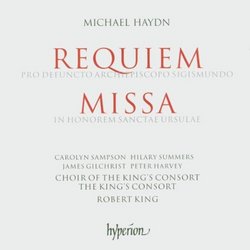| All Artists: Michael Haydn, Robert King, King's Consort, Carolyn Sampson, James Gilchrist Title: Michael Haydn: Requiem; Missa in Honorem Sanctae Ursulae Members Wishing: 1 Total Copies: 0 Label: Hyperion UK Release Date: 4/12/2005 Album Type: Import Genre: Classical Styles: Opera & Classical Vocal, Historical Periods, Classical (c.1770-1830), Early Music Number of Discs: 2 SwapaCD Credits: 2 UPC: 034571175102 |
Search - Michael Haydn, Robert King, King's Consort :: Michael Haydn: Requiem; Missa in Honorem Sanctae Ursulae
 | Michael Haydn, Robert King, King's Consort Michael Haydn: Requiem; Missa in Honorem Sanctae Ursulae Genre: Classical |
Larger Image |
CD Details |
CD ReviewsMichael Haydn Performed Magnificently Peter Gordon | Canberra, ACT Australia | 04/25/2005 (5 out of 5 stars) "This recent release is a double CD, although the total playing length is only around 83 minutes, with each Mass complete on one CD. Michael, the younger brother of the great Josef, was highly regarded in his own time, especially for his choral music. Mozart, who did not tolerate fools, was a friend. Schubert made a pilgrimage to his grave when visiting Salzburg. We have here two examples from some 30 Masses which Michael Haydn wrote. The first, composed in 1771, is a Requiem which bears some surface similarity to that which Mozart left incomplete at his death 20 years later. It's a fine work, especially the sombre opening movement. The Mass for St Ursula is from 1793, and perhaps more spectacular in its fugal writing. The performances are outstanding. The brass tones are pleasantly pungent, the strings clearly articulated, the singing of chorus and principals magnificent. The pace never flags even when the writing is less than totally inspired. One of the joys of the contemporary catalogue is the emergence of long neglected works by so called minor composers, especially of the classical era where the greater Haydn and Mozart are outnumbered countless times by names known only to the specialist. This release makes an important contribution in this direction, and anyone with an interest in post baroque choral music, or in the less travelled roads of the 18th century can buy with confidence." I am in complete agreement Bruce Bogin | rural France | 10/08/2006 (5 out of 5 stars) "I purchased this two CD set of Michael Haydn's works solely because of the previous review. The title of my review says it all. Based upon these works there is no reason why Michael Haydn should not enjoy the same acclaim as his famous brother. I like the Reqiem particularly. It is stirring and joyful. This set should be purchased by anyone who likes the religious music of Joseph Haydn and Mozart." A Great, Sparkly Gem Joseph Barbarie | new haven, CT | 05/22/2008 (4 out of 5 stars) "Michael Haydn lives in the titanic shadow cast by his elder sibling, Joseph. The life he lived, apparently, was a bit of a bohemian one -- Mozart's father disapproved of Wolfgang's friendship with the man.
One anecdote will suffice. Haydn, composer to the Archbishop-Elector of Salzburg (the same Archbishop with whom Mozart had his difficulties), owed his employer a set of string duos, for violin and viola. In bed, and very sick -- whether from a hangover or not is unclear -- Haydn told Mozart of his predicament. Mozart, for whom composing was simply a matter of tapping his bottomless keg of material, assisted his friend by producing the required set of duos. Not only that, Mozart made a point of imitating Haydn's style (even down to detail like use of appogiaturas). However, a story like this tends to diminish the man's actual accomplishment. Apparently, his reputation as a composer of religious music was, in his own time, at least the equal of his brother's. This is a large claim, especially taken in light of J. Haydn's monumental series of 12 "name day" masses for the Esterhazys at the end of his career. Here, though, that claim is more than vindicated. The "Gloria" movement in particular, from the "Sanctae Ursulae" mass, is probably the best single movement from the brothers' ouevre taken together. It begins with the main theme stated in unison by the lower orchestral voices and the entire chorus, a gesture of Tchaikovskian vastness, just sort of hanging there in space and glowing white-blue, like a great sparkly gem of a sun. This motive is threshed out in full symphonic manner through the rest of the movement, only to return once more, again proclaimed in enormous unison, at the conclusion. Both the theme, and its handling, are of unique quality and imagination. Throughout both works, Michael demonstrates a suavity in his orchestration and symphonic conception which equals, and in at least one instance, surpasses, that of his brother." |
